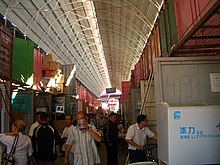Dordoi bazaar
The Dordoi Bazaar ( Kyrgyz : Дордой Базары) is a market in the Kyrgyz capital, Bishkek . It is considered the largest of its kind in Central Asia and is a major economic factor for Kyrgyzstan.
The bazaar belongs to the Dordoi Association , which also includes other markets and companies. The football club FK Dordoi Bishkek is also owned by the Dordoi Association.
location
The Dordoi Bazaar is located well away from the city center in northern Bishkek. The total area of the market is about one square kilometer. Most of the goods on offer are transported to the bazaar by truck .
history
The market was founded by Askar Salymbekow on August 31, 1991, shortly after Kyrgyzstan gained independence . Salymbekov was previously a functionary in the Communist Party of Kyrgyzstan , but turned to capitalism after the collapse of the Soviet Union and founded the Dordoi Bazaar. The impetus for the establishment of the market was in particular the insufficient supply of clothing in Kyrgyzstan, which should be improved by the new bazaar. The market started on a small area near the Dolen Omurzakov Stadium . The strong rush soon forced Salymbekow to look for a new site. He found this with the site of a former factory for processing sheep's wool ; he bought it and set the market there.
In the following years the market grew rapidly and developed into one of the largest markets in the region. In 2002, 15,000 stands had already set up on the site. The development of the market benefited from the political influence of the founder Salymbekow and from his good relationship with Askar Akajew , the then President of Kyrgyzstan. With the tulip revolution and the beginning of Kurmanbek Bakiyev's presidency , the relationship between the market operator and the government authorities deteriorated. At the same time, the Dordoi Bazaar was able to distinguish itself as a comparatively safe trading place, which was largely spared from organized crime in Kyrgyzstan.

The accession of Kyrgyzstan to the Eurasian Economic Union in 2015 brought about a significant change for the market . This was accompanied by a facilitation of trade relations with the other states of the Union, in particular with the most important trading partners Russia and Kazakhstan . At the same time, traders feared that trade relations with the People's Republic of China would be difficult .
In its history, the market has been ravaged by fires time and again, including on April 5, 2008, when a fire broke out in the morning, which the Bishkek fire brigade and the national guard called in could not finally put out until around 4 p.m.
In the course of the COVID-19 pandemic in Kyrgyzstan , the bazaar was temporarily closed, but was able to reopen on May 25, 2020 as the measures were relaxed.
offer
The focus of the offer at the Dordoi Bazaar is the clothing trade . With the development of the market into a hub in Eurasian trade, the range of goods has also increased significantly. Numerous Chinese goods come to Central Asia and Russia via the Dordoi Bazaar; Often goods purchased at the Dordoi Bazaar are also resold in other countries. So today electrical appliances , household appliances , carpets , auto parts , furniture and food are sold.
The goods are mainly sold from containers that are lined up in long alleys. The typical stand at the Dordoi Bazaar consists of two containers stacked on top of one another, the lower one serving as a sales area and the upper one as a warehouse. An estimated 30,000 of these containers make up the Dordoi Bazaar.
meaning
Due to its immense size, the bazaar is an important economic factor for Kyrgyzstan and plays an important role, especially in the trade in Chinese consumer goods in Russia and surrounding countries. In 2009, according to the World Bank, 150,000 jobs were directly or indirectly dependent on the Dordoi Bazaar. The bazaar's annual turnover is estimated at around US $ 3 billion , making it a prominent factor in the Kyrgyz economy.
Web links
Individual evidence
- ↑ Dordoi Bazaar. (No longer available online.) Archived from the original on May 8, 2017 ; Retrieved November 26, 2019 (American English). Info: The archive link was inserted automatically and has not yet been checked. Please check the original and archive link according to the instructions and then remove this notice.
- ^ Stephan Flechtner, Dagmar Schreiber: Kyrgyzstan . Trescher Verlag, Berlin, p. 138 .
- ^ Kyrgyzstan's Colossal Dordoi Bazaar: A Time of Opportunity and Change. Retrieved November 26, 2019 .
- ^ Dordoi Bazaar | Bishkek, Kyrgyzstan Attractions. Retrieved November 26, 2019 .
- ↑ Uzbek-favored Bishkek market catches fire - UzNews.net. April 9, 2008, archived from the original on July 24, 2011 ; accessed on November 26, 2019 (English).
- ↑ Kyrgyzstan to ease lockdown on more businesses from May 21, including malls, shops, small baths. Retrieved May 19, 2020 .
- ↑ Gulzat Matisakova: The three most famous bazaars of Bishkek. May 3, 2019, accessed November 26, 2019 .
- ↑ Kyrgyzstan's Dordoy Bazaar. Retrieved November 26, 2019 .
- ↑ A Steel Caravanserai Booms on the Modern Silk Road. Retrieved November 26, 2019 .
- ↑ 'Made in China' moves into Russia's backyard . In: Christian Science Monitor . January 4, 2007, ISSN 0882-7729 (English, csmonitor.com [accessed November 26, 2019]).
- ↑ Tobias Marschall: Looking inside the Dordoi bazaar. November 22, 2017. Retrieved November 26, 2019 (American English).
- ^ Kyrgyzstan's Colossal Dordoi Bazaar: A Time of Opportunity and Change. Retrieved November 26, 2019 .
Coordinates: 42 ° 56 ′ 0 ″ N , 74 ° 37 ′ 15 ″ E


